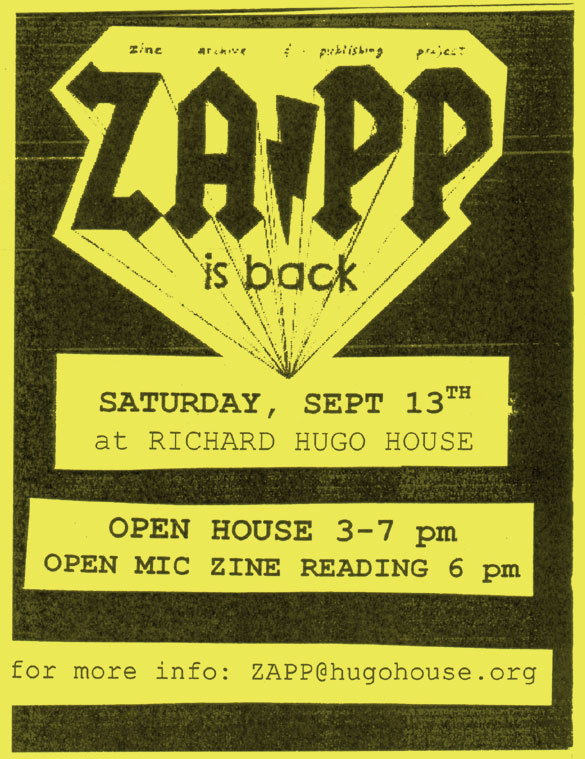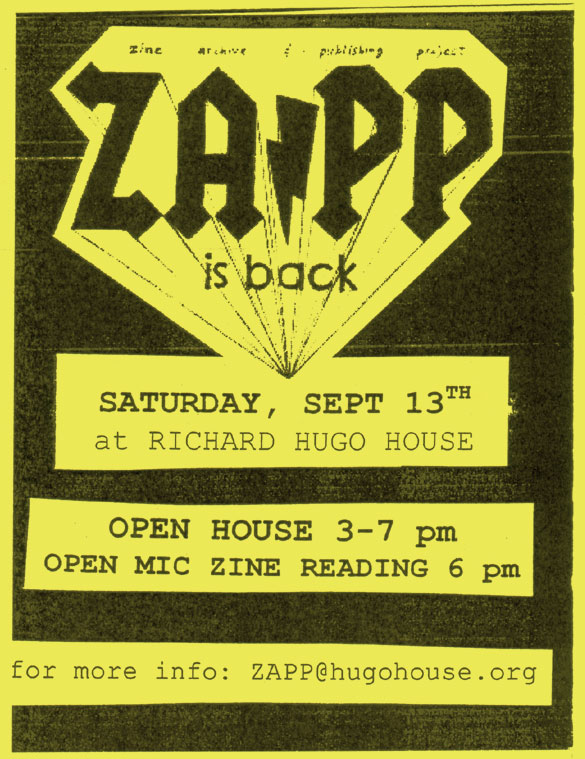 I have leaked some info on this before, but now I'm ready to come back and give you more.
I have leaked some info on this before, but now I'm ready to come back and give you more.
Exactly one year ago, the Zine Archive and Publishing Project (affectionately known as ZAPP) at the Richard Hugo House unexpectedly closed down to the public. The volunteers and community were shut out, and some of the most heart-wrenching dilemmas and communication disasters between the volunteers and the administration of the nonprofit organization rose to the surface. In case you don’t already know, zines are self-published periodicals and have emerged as an art form for many, many crazy punks, artists, scenesters, nomads, and other people who make their own categorization. Basically, you write a comic or an essay or a narrative then collage it, design it, bind it, and publish your words, your stream of consciousness and your soul to the world via the underground. Secretly make some copies at your office or school and then distribute at awesome local businesses that you support. (Distribution is always DIY and never on a tight publishing schedule, so is the prospect of finding a zine intangible and all the more special if you are lucky to come across one.) ZAPP in Seattle is the center for independent artists who wouldn’t normally have a center. Along with being a publishing workspace and run primarily by volunteers, ZAPP has accumulated a collection of over 20,000 zines.
Wait, hold it. Spell that out: Twen-ty-Thou-Sand. Two. Zero. Zero. Zero. Three Zeros. That’s two millenniums worth of magazines worked against the Man. What’s cool is that this project started as a small collection of a hundred or so zines ten years ago and has grown entirely through donations solely for the love of ‘em. When you have a library of this size, a lot of work goes into just the operations of it. For it to be a zine archive, you have to know how to archive the abstract periodicals and bring in archiving specialists for consultation. For it to be a zine library, you have to own a catalogue and know how to use it – or at least, know how to get one started, and cataloguing 20,000 items plus 2,000 mini-zines is no easy feat. And lastly but not leastly, you have to have it open. Because ultimately, this belongs to the community who made it.
No matter what you’re opinion is on the huge controversy, ZAPP (and the idea of) needs your support now more than ever. If no one’s running the project, if no one’s volunteering open hours shifts, if no one’s promoting ZAPP within and outside of city limits, if no one’s on the steering committees, if no one’s donating, and of course, if no one’s visiting, then how can you expect these beautiful zine babies to ever see the light of day again? Actually, they’re really not allowed to see the light anyways. Over time, light ruins paper. Bad for archiving. And so does water and humidity from floods, for that matter. That’s why it’s not in the basement anymore.
On Saturday, September 13th from 3-7pm, the volunteers of ZAPP are hosting an open house in the café (first floor) of Richard Hugo House in honor of your beloved zine archive. It’s a big party for all the zine lovers, and there will be free food (free!), the café will be open (drinks!), an open mic for zine readings, and tables celebrating all genres of zines. (ZAPP as a library is organized by genre – example categories include art, comics, DIY, literary, music, personal, travel and the ever elusive RARE zine collection.)
And every half hour of the event, volunteers will be conducting zine tours of the new library space upstairs so that you can see what the rad interns and the committee (made up of staff, old ZAPP volunteers and zine artists) have accomplished in the set up of the library since the closing. Stop by. Have fun. Archive needs love. Lots and lots of love. Like, now. Please.
In case you can't make the open house, open hours will be on Wednesdays from 4-8pm, Thursdays from 1-5pm, and Saturdays from 1-5pm beginning September 17th.
